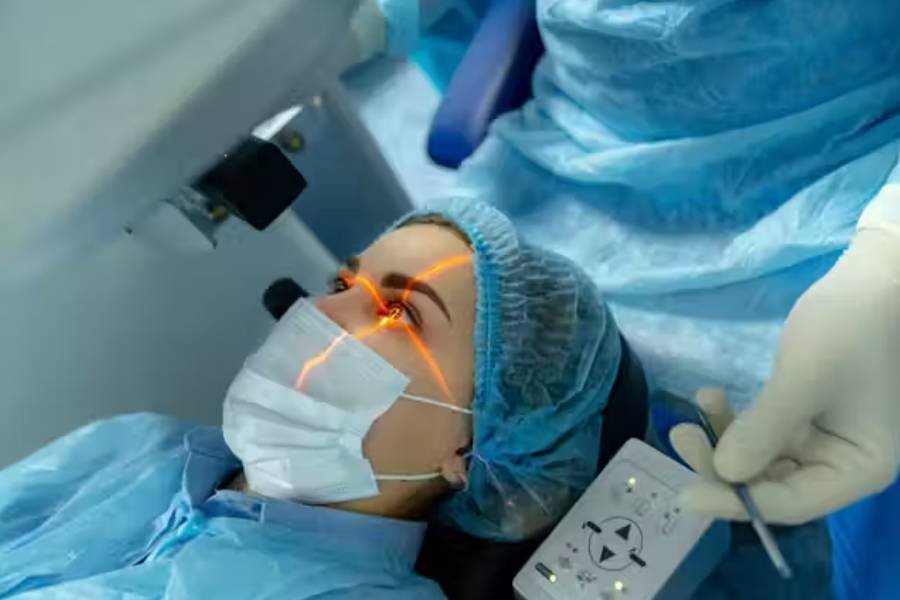NDP EyeCare | Dr. N D Patil | Dr. Gaurav Patil | Cataract | Glaucoma | Oculoplasty | LASIK
Our Latest Equipment is Best to keep your Vision perfect like Eagle!

What Is a Cataract
The Importance of Choosing the Right Cataract Specialist
Cataract surgery is among the most common and successful procedures in ophthalmology. Yet outcomes depend heavily on surgeon experience, technology, patient management, and follow-up. Choosing a skilled specialist reduces risks, improves visual results, enhances comfort, and ensures better long-term eye health.
Key qualities to evaluate:
Surgical volume and experience
Use of modern phacoemulsification and premium intraocular lenses
Precision in preoperative measurements
Safety protocols and infection control
Personalized patient care
Transparent communication of risks, benefits, expectations
Dr. Patil’s practice emphasizes these standards, aiming for optimal results for each patient.
Common Symptoms
Blurred or hazy vision
Difficulty driving at night (glare, halos)
Colors appear faded
Frequent changes in glasses prescription
Sensitivity to bright light
Difficulty reading small print
Classification and Types
Age-related (senile) cataracts: most common
Congenital cataracts: present from birth or early childhood
Secondary cataracts: due to systemic disease or medications
Traumatic cataracts: after eye injury
Complicated cataracts: associated with other ocular diseases
Each type may demand special care. Dr. Patil evaluates thoroughly to tailor surgery approach.
Diagnostic Evaluation Before Surgery
Before any surgical step, careful evaluation ensures safety and success. Dr. Patil’s team employs:
Comprehensive eye examination: slit lamp microscope, fundus exam, intraocular pressure measurement
Biometry (IOL power calculation): using optical coherence devices or ultrasound
Corneal topography / keratometry: to measure corneal curvature
Pachymetry: corneal thickness if needed
Dilated fundus exam: to detect any retinal issues
Tear film / dry eye assessment
General health assessment: blood sugar, blood pressure, ECG if indicated
This meticulous approach helps minimize surprises during surgery and tailor lens choice.
Surgical Techniques Employed
Dr. Patil offers advanced cataract surgical techniques, including:
Phacoemulsification
Ultrasound energy breaks up the lens, which is then removed via aspiration. Small incisions (2.2–2.8 mm) promote faster healing, minimal astigmatism, and less discomfort.
He uses the Centurion Vision System (from Alcon) in his operating theatre, enabling efficient and safe surgeries.
Femtosecond Laser Assisted Cataract Surgery (optional / premium)
For selected cases a laser may assist in key steps (capsulotomy, lens fragmentation). If available, Dr. Patil may incorporate this technique for premium outcomes (depending on patient suitability).
Small Incision Surgery
In special cases (e.g. advanced cataracts) incisions slightly larger but safe and effective may be used.
Premium Intraocular Lenses (IOLs)
Postoperative care is as crucial as surgery. Dr. Patil’s protocol includes:
Eye drops: antibiotic, steroid, anti-inflammatory
Shield/eye patch for initial hours
Follow-up visits on day 1, day 7, day 30, and as needed
Avoidance of strenuous activity for a short period
Instructions for hygiene, avoiding contamination, no rubbing
Monitoring for complications (infection, pressure spike, inflammation)
His team communicates clearly about recovery timeline, when to resume routine life, and when to report symptoms.
Benefits of Choosing Dr. N. D. Patil in Nagpur
High Experience Level
Dr. Patil has decades of ophthalmology experience, in academic and clinical settings, which strengthens his surgical judgment, complication management, and patient counseling.
Modern Infrastructure
State-of-the-art diagnostic instruments
Advanced phacoemulsification machine
Sterile operating environment
Capabilities to offer premium IOLs
Personalized Patient Care
He and his staff treat patients with empathy. Detailed explanations, expectation setting, and tailored choices are part of the approach.
Reputation and Trust
Patient testimonials often highlight his thoroughness, humility, and gentle manner. Many refer family members after positive outcomes.
Comprehensive Eye Services
Beyond cataract, NDP EyeCare manages glaucoma, oculoplastic surgery, ocular oncology, tear duct disorders, and more. Good for patients who may have coexisting eye issues.
Case Studies and Patient Experiences (Illustrative)
Senior patient with nuclear cataract
Complaints: blurred vision, frequent glasses change. Underwent phaco + monofocal IOL. Vision improved to 6/6. Patient praised the painless surgery and quick recovery.Patient with significant astigmatism
Complaints: distorted vision, glare. Dr. Patil recommended toric IOL and aligned the axis precisely. Postoperative vision was crisp without needing cylindrical glasses.Mixed lens with early glaucoma suspicion
Diagnosed with cataract and optic nerve changes. Surgery was planned carefully, IOP monitored, retinal evaluation conducted. Outcome: good vision, stable ocular parameters.
Each case required clinical judgment, patient counseling, and customization of lens choice and surgical steps.
Common Risks, Complications & Management
No surgery is risk-free. Key risks include:
Endophthalmitis (infection)
Posterior capsule rupture
Vitreous loss
Corneal edema
Elevated intraocular pressure
Macular edema
Residual refractive error
Dislocation of IOL
Cystoid macular edema
Dr. Patil’s approach includes:
Strict sterilization
Prophylactic antibiotics
Immediate recognition and management
Rescue measures (vitrectomy, additional surgery)
Close postoperative follow-up
His experience helps reduce incidence of complications and allows prompt handling if they arise.
Book an Appointment Today
If you are searching for the best glaucoma specialist in Nagpur, look no further than Dr. N.D. Patil at the Centre of Advanced Eye Care. Early intervention is the key to preserving your sight. So, don’t wait until it’s too late—schedule your consultation today and take the first step toward protecting your vision.

